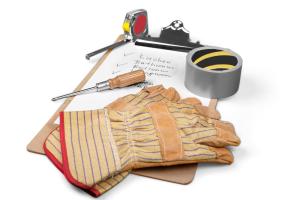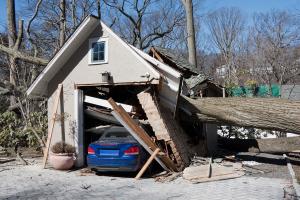7 things that burglars hate

They say one's home is one's castle. Unfortunately, if you are a homeowner reading this, your castle probably doesn't have a moat. The average loss from a home burglary has climbed to $7,815 in stolen property.
Fortunately, there are several tried and true ways to prevent intruders, such as having a security system or getting a dog. But, there are some effective lesser-known steps that are easy to implement. This list of tips can help you roll out the "unwelcome mat" to would-be thieves.
1. Hidden valuables
Most thieves tend to head right to the master bedroom when they are looking for valuables. Hiding such items in a different room reduces the chances of being found. Also, consider conspicuous spaces such as a hollowed-out book, false VHS tape carton, false container of food or wrapped in tinfoil in the back of the refrigerator.
Make sure whatever clever spot you have avoids spaces with water or where excess food or moisture could possibly damage your valuables.
2. Strategic landscaping
Keeping large or dense shrubbery away from your home gives thieves fewer places to hide. Conversely, thorny bushes, like roses, can also help deter break-ins when planted near windows.
Also, consider asking a trusted friend or neighbor to mow your lawn if you are away for an extended time to avoid having your house seem vacant.
3. Lights – inside or out
Motion detection lights (for exteriors) and lights on timers (inside your home) will give burglars less cover, and more reason to question whether or not your home is occupied.
Plus, combining an exterior light with a security system is an excellent way to deter burglars.
4. A car in the driveway
Surprisingly, most burglaries happen during the day, with peak activity at 8-9 a.m., 12-1 p.m. and 5-6 p.m. while you are probably at work.
However, most thieves are deterred if it looks like someone is home. One really simple way to do this is to make sure a car is parked in your driveway, and that it is kept clean and moved often.
5. Dowel rods
When correctly cut and measured, they are an inexpensive and unobtrusive solution for securing sliding doors and windows.
6. Caution
Potential burglars (or their accomplices) sometimes visit your home under the guise of providing service or repair work. Each time service people enter your home —for instance, to go to the bathroom — make sure after they've left that they haven't taken the liberty of unlocking any doors or windows while inside. Doing so could help thwart a later attempt at intrusion.
7. Helpful neighbors
In addition to having someone willing to trim your lawn, a neighbor can act as a helpful set of eyes when you are away for an extended time. Asking them to bring in any mail and packages you receive, as well as empty trash cans and recycling bins can help avoid making your home look vacant - and an easier target for potential thieves.
Call for backup
Talk to your independent insurance agent about coverage options geared towards theft, such as personal property replacement cost protection for damaged, destroyed or stolen property. For homeowners with exceptionally valuable items in their home, a scheduled item endorsement can offer maximum coverage against not just theft, but breakage and disappearance as well.
To help you keep your "castle" safe from intruders, The Hanover partners with Scout to provide home insurance customers with an elevated level of home security solutions. Learn more about Scout, and all of our affiliated service providers at our Partners in Protection page.
Sources
Related resources
7 things that burglars hate
They say one's home is one's castle. Unfortunately, if you are a homeowner reading this, your castle probably doesn't have a moat. The average loss from a home burglary has climbed to $7,815 in stolen property.
Fortunately, there are several tried and true ways to prevent intruders, such as having a security system or getting a dog. But, there are some effective lesser-known steps that are easy to implement. This list of tips can help you roll out the "unwelcome mat" to would-be thieves.
1. Hidden valuables
Most thieves tend to head right to the master bedroom when they are looking for valuables. Hiding such items in a different room reduces the chances of being found. Also, consider conspicuous spaces such as a hollowed-out book, false VHS tape carton, false container of food or wrapped in tinfoil in the back of the refrigerator.
Make sure whatever clever spot you have avoids spaces with water or where excess food or moisture could possibly damage your valuables.
2. Strategic landscaping
Keeping large or dense shrubbery away from your home gives thieves fewer places to hide. Conversely, thorny bushes, like roses, can also help deter break-ins when planted near windows.
Also, consider asking a trusted friend or neighbor to mow your lawn if you are away for an extended time to avoid having your house seem vacant.
3. Lights – inside or out
Motion detection lights (for exteriors) and lights on timers (inside your home) will give burglars less cover, and more reason to question whether or not your home is occupied.
Plus, combining an exterior light with a security system is an excellent way to deter burglars.
4. A car in the driveway
Surprisingly, most burglaries happen during the day, with peak activity at 8-9 a.m., 12-1 p.m. and 5-6 p.m. while you are probably at work.
However, most thieves are deterred if it looks like someone is home. One really simple way to do this is to make sure a car is parked in your driveway, and that it is kept clean and moved often.
5. Dowel rods
When correctly cut and measured, they are an inexpensive and unobtrusive solution for securing sliding doors and windows.
6. Caution
Potential burglars (or their accomplices) sometimes visit your home under the guise of providing service or repair work. Each time service people enter your home —for instance, to go to the bathroom — make sure after they've left that they haven't taken the liberty of unlocking any doors or windows while inside. Doing so could help thwart a later attempt at intrusion.
7. Helpful neighbors
In addition to having someone willing to trim your lawn, a neighbor can act as a helpful set of eyes when you are away for an extended time. Asking them to bring in any mail and packages you receive, as well as empty trash cans and recycling bins can help avoid making your home look vacant - and an easier target for potential thieves.
Call for backup
Talk to your independent insurance agent about coverage options geared towards theft, such as personal property replacement cost protection for damaged, destroyed or stolen property. For homeowners with exceptionally valuable items in their home, a scheduled item endorsement can offer maximum coverage against not just theft, but breakage and disappearance as well.
To help you keep your "castle" safe from intruders, The Hanover partners with Scout to provide home insurance customers with an elevated level of home security solutions. Learn more about Scout, and all of our affiliated service providers at our Partners in Protection page.
Sources
Related resources
7 things that burglars hate
They say one's home is one's castle. Unfortunately, if you are a homeowner reading this, your castle probably doesn't have a moat. The average loss from a home burglary has climbed to $7,815 in stolen property.
Fortunately, there are several tried and true ways to prevent intruders, such as having a security system or getting a dog. But, there are some effective lesser-known steps that are easy to implement. This list of tips can help you roll out the "unwelcome mat" to would-be thieves.
1. Hidden valuables
Most thieves tend to head right to the master bedroom when they are looking for valuables. Hiding such items in a different room reduces the chances of being found. Also, consider conspicuous spaces such as a hollowed-out book, false VHS tape carton, false container of food or wrapped in tinfoil in the back of the refrigerator.
Make sure whatever clever spot you have avoids spaces with water or where excess food or moisture could possibly damage your valuables.
2. Strategic landscaping
Keeping large or dense shrubbery away from your home gives thieves fewer places to hide. Conversely, thorny bushes, like roses, can also help deter break-ins when planted near windows.
Also, consider asking a trusted friend or neighbor to mow your lawn if you are away for an extended time to avoid having your house seem vacant.
3. Lights – inside or out
Motion detection lights (for exteriors) and lights on timers (inside your home) will give burglars less cover, and more reason to question whether or not your home is occupied.
Plus, combining an exterior light with a security system is an excellent way to deter burglars.
4. A car in the driveway
Surprisingly, most burglaries happen during the day, with peak activity at 8-9 a.m., 12-1 p.m. and 5-6 p.m. while you are probably at work.
However, most thieves are deterred if it looks like someone is home. One really simple way to do this is to make sure a car is parked in your driveway, and that it is kept clean and moved often.
5. Dowel rods
When correctly cut and measured, they are an inexpensive and unobtrusive solution for securing sliding doors and windows.
6. Caution
Potential burglars (or their accomplices) sometimes visit your home under the guise of providing service or repair work. Each time service people enter your home —for instance, to go to the bathroom — make sure after they've left that they haven't taken the liberty of unlocking any doors or windows while inside. Doing so could help thwart a later attempt at intrusion.
7. Helpful neighbors
In addition to having someone willing to trim your lawn, a neighbor can act as a helpful set of eyes when you are away for an extended time. Asking them to bring in any mail and packages you receive, as well as empty trash cans and recycling bins can help avoid making your home look vacant - and an easier target for potential thieves.
Call for backup
Talk to your independent insurance agent about coverage options geared towards theft, such as personal property replacement cost protection for damaged, destroyed or stolen property. For homeowners with exceptionally valuable items in their home, a scheduled item endorsement can offer maximum coverage against not just theft, but breakage and disappearance as well.
To help you keep your "castle" safe from intruders, The Hanover partners with Scout to provide home insurance customers with an elevated level of home security solutions. Learn more about Scout, and all of our affiliated service providers at our Partners in Protection page.
Sources
Related resources
7 things that burglars hate
They say one's home is one's castle. Unfortunately, if you are a homeowner reading this, your castle probably doesn't have a moat. The average loss from a home burglary has climbed to $7,815 in stolen property.
Fortunately, there are several tried and true ways to prevent intruders, such as having a security system or getting a dog. But, there are some effective lesser-known steps that are easy to implement. This list of tips can help you roll out the "unwelcome mat" to would-be thieves.
1. Hidden valuables
Most thieves tend to head right to the master bedroom when they are looking for valuables. Hiding such items in a different room reduces the chances of being found. Also, consider conspicuous spaces such as a hollowed-out book, false VHS tape carton, false container of food or wrapped in tinfoil in the back of the refrigerator.
Make sure whatever clever spot you have avoids spaces with water or where excess food or moisture could possibly damage your valuables.
2. Strategic landscaping
Keeping large or dense shrubbery away from your home gives thieves fewer places to hide. Conversely, thorny bushes, like roses, can also help deter break-ins when planted near windows.
Also, consider asking a trusted friend or neighbor to mow your lawn if you are away for an extended time to avoid having your house seem vacant.
3. Lights – inside or out
Motion detection lights (for exteriors) and lights on timers (inside your home) will give burglars less cover, and more reason to question whether or not your home is occupied.
Plus, combining an exterior light with a security system is an excellent way to deter burglars.
4. A car in the driveway
Surprisingly, most burglaries happen during the day, with peak activity at 8-9 a.m., 12-1 p.m. and 5-6 p.m. while you are probably at work.
However, most thieves are deterred if it looks like someone is home. One really simple way to do this is to make sure a car is parked in your driveway, and that it is kept clean and moved often.
5. Dowel rods
When correctly cut and measured, they are an inexpensive and unobtrusive solution for securing sliding doors and windows.
6. Caution
Potential burglars (or their accomplices) sometimes visit your home under the guise of providing service or repair work. Each time service people enter your home —for instance, to go to the bathroom — make sure after they've left that they haven't taken the liberty of unlocking any doors or windows while inside. Doing so could help thwart a later attempt at intrusion.
7. Helpful neighbors
In addition to having someone willing to trim your lawn, a neighbor can act as a helpful set of eyes when you are away for an extended time. Asking them to bring in any mail and packages you receive, as well as empty trash cans and recycling bins can help avoid making your home look vacant - and an easier target for potential thieves.
Call for backup
Talk to your independent insurance agent about coverage options geared towards theft, such as personal property replacement cost protection for damaged, destroyed or stolen property. For homeowners with exceptionally valuable items in their home, a scheduled item endorsement can offer maximum coverage against not just theft, but breakage and disappearance as well.
To help you keep your "castle" safe from intruders, The Hanover partners with Scout to provide home insurance customers with an elevated level of home security solutions. Learn more about Scout, and all of our affiliated service providers at our Partners in Protection page.
Sources






